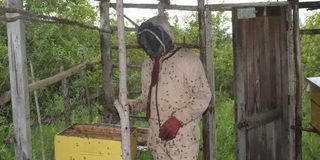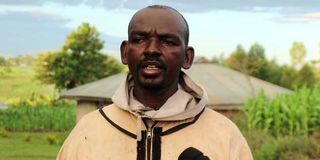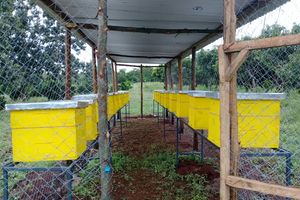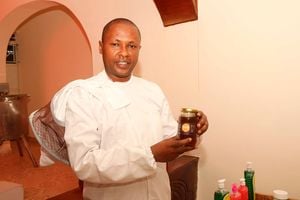
Samuel Oyugi, in protective gear, inspects a hive in Andiwo Village in Ndhiwa, Homa Bay County. The farmer harvests honey three times a year and is looking for wax buyers.
It is 6pm in Andiwo village, Homa Bay County. This is the time Samuel Oyugi inspects his hives.
Oyugi, 39, has been a bee-keeper for two years.
Inspection requires attention and care. A slight mistake can lead to injuries or even death. Oyugi puts on a special suit to protect himself from stings. He also has gloves, boots and carries a smoker. Oyugi’s apiary is in a secluded place, far from his house and neighbours.
“I’ve never had a bad experience with the bees. My neighbours know I am a bee-keeper and take the necessary precautions,” he says.
He first closes the entrance to one of the hives being inspected. Oyugi then opens the outer cover and inspects the queen excluder, frames, brood and other components. He then covers the hive before leaving for the next.

Samuel Oyugi at his farm in Andiwo Village in Ndhiwa, Homa Bay County.
Before venturing into apiculture, Oyugi was an ordinary farmer, growing sugarcane and maize. He was not happy with the money he made from the two crops. “I actually considered myself jobless. I had to look for something else to do,” he says.
Oyugi saw a gap in honey production in Homa Bay, as most of the honey that residents buy in supermarkets is from other regions.
“I saw an opportunity in apiculture. Honey is medicinal and its demand is rising,” he says.
The Sh150,000 Oyugi had as savings was his capital. He bought hives, each costing Sh5,000. He then put up the apiary and fenced it. He got most of bee-keeping lessons on YouTube.
Luckily, a river flows near Andiwo village, and residents encounter wild bees when grazing their animals. “I took advantage of this to trap bees and bring them to the apiary. To do that, I placed a hive near the river,” Oyugi says.
Weeks later, the 10 hives on Oyugi’s land were full of bees.
Oyugi’s agribusiness is growing faster than he expected, and he recently bought another set of hives.
Oyugi harvests honey three times a year.
He uses his experience in apiculture to pass knowledge to upcoming bee farmers in Homa Bay and neighbouring counties.
A hive produces at least seven kilogrammes of honey. “I get an average of 70 kilos per harvest. A kilo of raw honey goes for Sh1,000,” he says.
Before selling, Oyugi removes foreign matter from the honey by sieving. He also separates honey from wax. The honey he sells has no additives. “I am still looking for wax buyers,” he says, adding that he plans to increase the number of hives by at least 50.
Oyugi has befriended other farmers in the honey business and they intend to intend to register a cooperative society for bee-keepers. The society will have at least 200 farmers, he says. Oyugi is the interim coordinator of the group.

Samuel Oyugi prepares to inspect bee hives at his farm in Andiwo Village in Ndhiwa, Homa Bay County.
A majority of bee-keepers in Homa Bay are in Wire, Rachuonyo South. According to Oyugi, some companies have been making inquiries on when the society will be registered so they can buy honey in bulk. The group has not yet hit the production target set by the companies.
“We ask every bee farmer to register with us. We are soon taking the registration documents to relevant authorities,” he says, adding that the government needs to support apiculture.
Oyugi says support from the government mainly targets crop, livestock and fish farmers.
“Bee-keeping can be a major source of income if the government supports us. Farmers need to be trained on best practices,” he says.
Local bee farmers also lack the necessary kits used in producing honey, including protective suits.
Zachary Odero, a farming expert, says bee-keepers should ensure enough nectar for the insects. He advises farmers to plant flowers and trees near their hives. According to the expert, farmers engaged in honey and wax production must ensure the apiary is near a water source. “The bees should not cover long distances in search of flowers and water. What they need to produce the honey should be near the hives,” Mr Odero says, and advises bee-keepers to have good production records.









